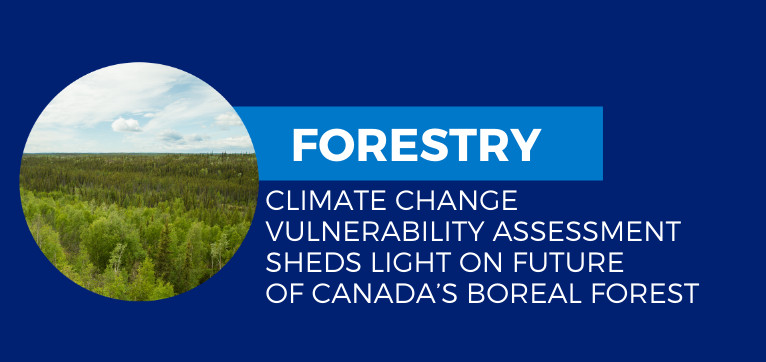Earth Day has a different feel this year. The theme, climate action, has a unique significance in the world we live in right now. Protecting our planet and its resources – from people to plants to water – and finding sustainable solutions requires creativity, innovation and courage. Instead of focusing on what’s going wrong (because let’s face it, we all know the challenges the planet faces right now), we wanted to raise awareness about what’s going right.
Here are four projects and initiatives our research and technology experts are working on to help industry, governments and communities make positive environmental impacts.

Forestry
Climate change is affecting Canada’s forests to a greater extent than other parts of the globe. Extensive forest fires, insect outbreaks and drought have all affected Canadian forests in the past decade, and these disturbances appear to be increasing.
A climate change vulnerability assessment is currently underway in Saskatchewan and Manitoba to shed light on what climate change will look like in the boreal forest and how to reduce its impacts.

Biodiversity
Since ancient time, humans have depended on various ecosystem services, such as food, clean water, construction materials, medicinal ingredients, pollination and recreation. These vital services are only available to us because of biodiversity.
Next year begins the United Nations Decade on Ecosystem Restoration. Our Project CLEANS team is remediating abandoned uranium sites in northern Saskatchewan and one aspect of our work is promoting biodiversity by improving conditions and creating wildlife habitat on contaminated sites.

Soil
Every ecosystem on the planet is affected by human activity, and as climate change continues to have wide-spread effects on our environment, these impacts will only become more significant.
Soil scientists have proposed a new type of soil based on the wide-spread effects of human activity: Anthroposols. We task this novel soil to mimic and support our ecosystems, but we're not sure how to measure its performance over time. One scientist at SRC is studying possible measures to see how well Anthroposols can supply nutrients to Canada's boreal forest.

Emissions
Given both global and national pressure to decarbonize operations, Canadian industries are looking for new technologies and implementing more energy-efficient processes from proven, applicable mitigation options.
Our CeDER platform helps companies sift through and test available technologies to evaluate their performance in real-world situations against client needs. This work will support reducing greenhouse gas emissions to meet regulatory requirements.
environmental performance
SRC helps clients and stakeholders move beyond environmental compliance into best practices in areas such as emissions reduction and energy savings. In 2018-19, our work resulted in greenhouse gas reductions of more than 22 kilotonnes per year and energy savings equivalent to more than 40 million kilowatt-hours.
We'll continue exploring opportunities and developing sustainable solutions, now and in the future (however it may look), that create positive environmental impacts in our province and around the world.
